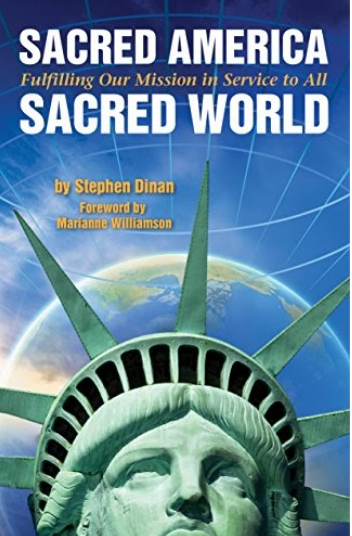


The declining culture is one in which the boundary of community, identity, and concern are focused on the national level or still more partial identities of race, class, religion, or party. For those on the inside of our boundary of “us,” we champion the best for them. Within this in-group, we mostly align our economic interests. For those on the outside of this boundary, we retain a certain suspicion, a protective looking out for “our” interests versus theirs. In the more extreme forms, it can result in xenophobia and extreme nationalism that is based in discrimination, as we see in some extreme right parties.
This strong sense of national identity is reflected in the distribution of military forces — no forces are focused on protecting boundaries between American states, for example, while massive resources are allocated to potential disputes with other countries. When most US citizens are asked who they are, they are likely to say “American” before saying, “I’m a Minnesotan” or “I’m a global citizen.” When we watch the Olympics, the coverage focuses on “our” team. The medal count becomes a measure of our national worth in competition with other nations. Similarly, when reporting on armed conflicts or natural disasters, the primary concern is how many of “our” people were injured or killed. The total body count, if even reported, is largely secondary.
Although it remains dominant, this nation-centered culture is declining in power. On the Internet, national boundaries are nonexistent. In commerce, we are increasingly an interconnected world, with transnational corporations operating globally. Our environmental challenges do not respect national boundaries. Science is a global endeavor, as is finance. Even our entertainment, food, and travel are all increasingly global.
So, while nation-centered culture still wields great political power, the underpinning psychology and infrastructure are starting to shift in dramatic ways, which will ultimately mean a shift toward a global sense of culture and identity. Eventually, we’ll be more concerned with how many people died in an earthquake than how many Americans. We’ll be more likely to celebrate the best athlete’s achievements than the best American’s. We’ll champion global accords when addressing environmental challenges rather than focusing on narrowly defined national interests. The ascending culture of America 7.0 is thus global in its sense of identity and sphere of concern. It is grounded in a unified sense of community with the whole planet rather than separating people into enemies and friends.
As the interweaving of nations and the evolution of global consciousness proceeds further and we evolve more reliable structures for global peacemaking, it will eventually make large militaries less necessary, gradually replaced by smaller police forces to protect the peace within nations. En route to that endpoint, though, we face many challenges, the primary one for America being the balance between the security that our current military power can provide and the decrease in our nationalistic focus that is required for the long-term health of ourselves and our world.
That’s why the task of honoring (and seeing clearly) what has gone before us is so important. If the transition to the ascending global operating system is too abrupt, we may undermine the foundations for its emergence by rejecting the economic and military stabilizing force that we now offer. We would risk leaving behind the values of the conservative right that support family, local community, and national sovereignty.
The ascending culture needs time to mature and grow structures of support and collaboration. Millions of people need to evolve their worldview. Organizationally, the ascending culture needs media, institutions, and political platforms that embody and reinforce its global focus.
America is thus in a pivotal position to help usher in a new era. To the extent that we cling to our 6.0 alphadominant-nationalistic status for too long, we become the problem that the rest of the world needs to address. If we shift our alpha-dominant status too early, destructive ethnic, religious, and tribal rivalries will flare up at the same time that we face mounting global crises that require a coherent response. That’s why we are best served to honor what has made our country successful while fostering new initiatives that are global in their scope, while we test out what works.
For America to play a leadership role in the next stage of our planet’s evolution, as I believe was imprinted in the founding codes of our country, we must see ourselves as champions of the ascending 7.0 global culture while also respecting the 6.0 America-centric culture and its gifts.
As the ascending culture gains prominence in the coming decades, there will be a relaxation of the tension that characterizes the boundaries between countries. From a spiritual perspective, these boundaries create an uncomfortable friction that can eventually erupt as war and conflict. This friction wastes money, time, and resources. Evolving a truly global perspective will eventually eliminate the need to protect artificial borders and thus open to the possibility of a far freer and more prosperous world.
America 7.0 holds great promise, not only for our citizens but for the entire world. It is a fulfillment of millennia of cultural evolution, striving toward better systems of governance, culture, and consciousness. It may not be our last operating system, but I believe it is the operating system that can help us transition to a peaceful and thriving planet. And that will be a gift for which we will all be eternally grateful.
To be continued in the next issue of Catalyst...
Click on the following to read: Installment #1 Installment #2 Installment #3 Installment #4 Installment #5 Installment #6
To order your copy of Sacred America, Sacred World, click here.
Catalyst is produced by The Shift Network to feature inspiring stories and provide information to help shift consciousness and take practical action. To receive Catalyst twice a month, sign up here.
This article appears in: 2021 Catalyst, Issue 16 - The Beyond the Veil Summit